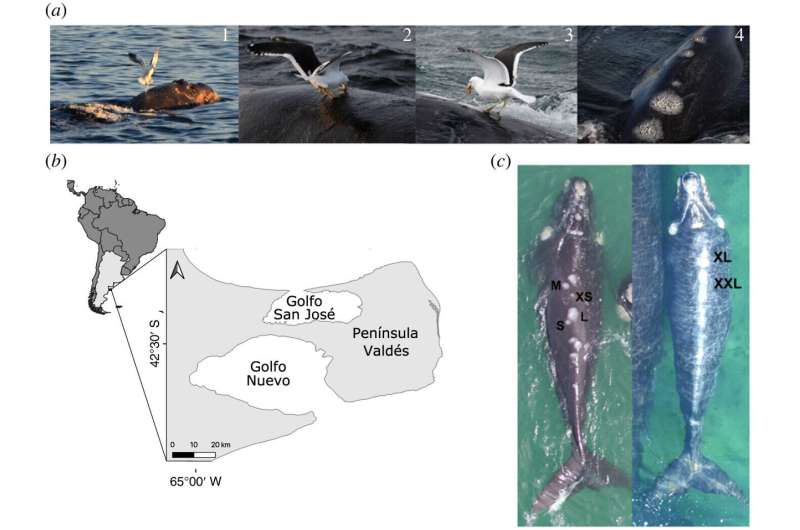June 8, 2023 report
This article has been reviewed according to Science X's editorial process and policies. Editors have highlighted the following attributes while ensuring the content's credibility:
fact-checked
peer-reviewed publication
trusted source
proofread
Long-term analysis finds seagull attacks contribute to death of southern right whale calves

A small international team of marine scientists has found that a drop in southern right whale populations who spend part of their lives off the coast of Argentina, is due to attacks on calves by kelp gulls. In their study, reported in the journal Biology Letters, the group analyzed decades of photographs taken of the whales.
Southern right whales are a type of baleen whale that inhabits oceans south of the equator. They are easily recognized by the callosities on their heads, their broad backs and absence of a dorsal fin. Adult females can grow to nearly 15 meters and weigh up to 47 metric tons. They are also notable for their active surface behavior, which has put them at risk from boats and attacks by seagulls.
The gulls peck at their backs, tearing bits of skin and fat away, leaving small wounds. In this new effort, the researchers noted that the numbers of southern right whales living off the coast of Argentina during the winter has been declining, as has the number of calves overall. Some evidence suggests that these declines might be related to changes in gull behavior—instead of attacking adult whales, they have been focusing their efforts on calves.
To find out if this might be the case, the research team obtained and analyzed over 600 pictures of the whales taken from aircraft over the past half-century.
They found pecking scars less often on adult whales over time and more often on calves. They also noted that some prior researchers had found that calves were spending much more time attempting to avoid the gulls than prior generations. And they found evidence in the photographs that wounds inflicted on the calves were more severe than on the adults.
The research team found that the gull attacks did not kill the calves directly; instead, they made them less robust, which made it more difficult to survive seasonal migrations, which began before they reached maturity. The photographs showed that from 1990 on, fewer and fewer calves were surviving their migrations, resulting in fewer returning the following year.
More information: Macarena Agrelo et al, Effect of kelp gull harassment on southern right whale calf survival: a long-term capture–recapture analysis, Biology Letters (2023). DOI: 10.1098/rsbl.2023.0119
Journal information: Biology Letters
© 2023 Science X Network




















